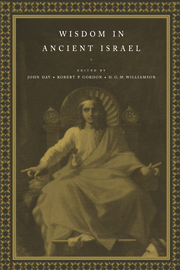Book contents
- Frontmatter
- Contents
- List of abbreviations
- Introduction
- Part 1 The ancient near eastern setting
- Part 2 Old Testament and Apocryphal texts
- 4 Foreign Semitic influence on the wisdom of Israel and its appropriation in the book of Proverbs
- 5 The limits of theodicy as a theme of the book of Job
- 6 Qoheleth
- 7 A house divided: wisdom in Old Testament narrative traditions
- 8 Wisdom in Solomonic historiography
- 9 Amos and wisdom
- 10 Hosea and the wisdom tradition: dependence and independence
- 11 Isaiah and the wise
- 12 Jeremiah and the wise
- 13 The wisdom psalms
- 14 Wisdom and Daniel
- 15 Ecclesiasticus: a tract for the times
- 16 The Christian use and the Jewish origins of the Wisdom of Solomon
- Part 3 Themes
- Biographical note: John Adney Emerton
- Bibliography of the works of John Adney Emerton
- Indexes
- Principal biblical and apocryphal references
9 - Amos and wisdom
Published online by Cambridge University Press: 16 October 2009
- Frontmatter
- Contents
- List of abbreviations
- Introduction
- Part 1 The ancient near eastern setting
- Part 2 Old Testament and Apocryphal texts
- 4 Foreign Semitic influence on the wisdom of Israel and its appropriation in the book of Proverbs
- 5 The limits of theodicy as a theme of the book of Job
- 6 Qoheleth
- 7 A house divided: wisdom in Old Testament narrative traditions
- 8 Wisdom in Solomonic historiography
- 9 Amos and wisdom
- 10 Hosea and the wisdom tradition: dependence and independence
- 11 Isaiah and the wise
- 12 Jeremiah and the wise
- 13 The wisdom psalms
- 14 Wisdom and Daniel
- 15 Ecclesiasticus: a tract for the times
- 16 The Christian use and the Jewish origins of the Wisdom of Solomon
- Part 3 Themes
- Biographical note: John Adney Emerton
- Bibliography of the works of John Adney Emerton
- Indexes
- Principal biblical and apocryphal references
Summary
At the end of the 1940s Johannes Fichtner published an important, pioneering study on ‘Isaiah among the Wise’. He argued mainly that wisdom in Israel was not, as had often been suggested, a purely post-exilic phenomenon, but that there were considerable traces of its existence in the writings of the eighth-century prophet Isaiah. He dismissed the possibility, however, that traces of wisdom could also be found in the other prophets of that century: Hosea, Amos and Micah; wherever such traces are allegedly found, one is dealing with later additions. It is interesting that, according to Fichtner, Isaiah mostly took a strong stand against the sages.
In the present chapter, which I wish to dedicate to one who is not only a colleague but also a friend, I intend to check on the assertion that there is no wisdom to be found in Amos.
First of all, this statement has not met with general approval. Terrien and Crenshaw have each written an essay dedicated to the subject, and the matter is further referred to explicitly in the commentaries of Wolff, Mays, Rudolph, van Leeuwen, and Paul, as well as in my own. Wolff considers any ‘admonition speech’ (Mahnrede) to be derived from wisdom, a thesis which Rudolph rightly criticizes (see also van Leeuwen); the same is true of the use of hôy in invectives, a proposal which is obviously untenable. In another article, Lindblom accepts that there are analogies of style between the writings of the wise men and the prophets, even though none of the latter belonged to a wisdom school.
- Type
- Chapter
- Information
- Wisdom in Ancient Israel , pp. 119 - 123Publisher: Cambridge University PressPrint publication year: 1995
- 1
- Cited by

